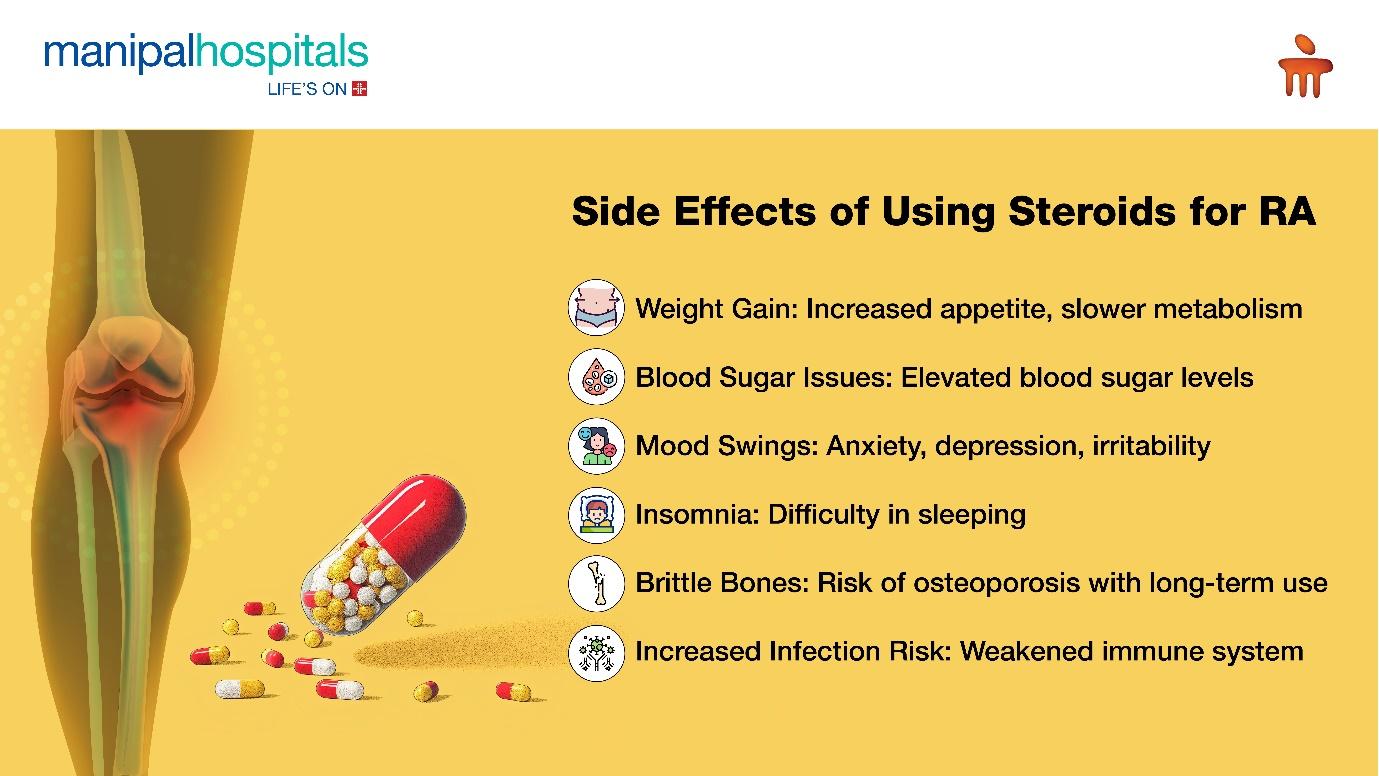
Living with rheumatoid arthritis (RA) can be a daily battle with pain, stiffness, and swollen joints. While there's no trick to cure RA instantly, medications can significantly improve the quality of life of those living with the condition. One of the options that might come across is steroids, but it's important to understand how they work and the potential drawbacks specifically for rheumatoid arthritis and steroids.
Synopsis
Rheumatoid Arthritis and Steroids
Unlike the performance-enhancing drugs some athletes misuse, steroids used for RA are corticosteroids. These mimic a natural hormone your body produces to fight inflammation. In RA, an autoimmune disease where your immune system mistakenly attacks your joints, corticosteroids can offer much-needed relief. They work by suppressing the overactive immune response, reducing inflammation, and easing pain and stiffness in the joints.
Types of Steroid Relief for RA
Prednisone is one of the most commonly prescribed steroids for rheumatoid arthritis. It comes in a convenient pill form and can be taken daily for ongoing management or just during flare-ups when symptoms worsen. In some cases, doctors might recommend steroid types of steroid injections directly into a particularly inflamed joint for targeted pain relief. Here are some commonly used injectable corticosteroids:
-
Triamcinolone acetonide: This is a long-acting steroid often used for larger joints like knees and hips.
-
Methylprednisolone acetate: Another long-acting option, methylprednisolone acetate can also be used in larger joints.
-
Triamcinolone hexacetonide: This is a less common injection, but it may be used for smaller joints or those that require less frequent injections.
Right Dose: A Balancing Act
Finding the right dosage of steroids depends on various factors, right from your overall health to the severity of the RA. Doctors typically start with a low dose and monitor your response. The goal is to find the "sweet spot" – the lowest effective dose that controls your symptoms while minimizing side effects.
Side Effects to Watch Out for

While steroids offer undeniable relief, they can come with side effects, especially when taken long-term, such as:
-
Weight gain: Steroids can increase your appetite and slow down your metabolism, leading to weight gain.
-
Blood sugar issues: Steroids can raise your blood sugar levels, which is a concern for people with diabetes or prediabetes.
-
Mood swings: Steroids can affect your mood, causing anxiety, depression, or irritability.
-
Difficulty in sleeping: Sleeping problem is one of the most common side effects of steroids.
-
Brittle bones: Long-term use of steroids can weaken your bones and increase your risk of osteoporosis.
-
Risk of infection: Steroids can weaken the immune system, increasing susceptibility to infections.
Steroids can be a powerful tool for managing RA symptoms, but they're not a long-term solution on their own. Doctors often prescribe them alongside other medications called DMARDs (disease-modifying antirheumatic drugs). DMARDs work by slowing down the progression of RA, while steroids address the immediate symptoms.
Consult our rheumatologist in Mangalore if you want treatment and manage the side effects of steroids taken for rheumatoid arthritis.
Living Well with RA: Additional Tips
Here are some additional tips that can help you manage RA alongside any medications your doctor prescribes:
-
Healthy weight maintenance: Excess weight can add extra strain to your joints.
-
Exercise regularly: Exercise strengthens muscles and improves joint flexibility. Activities such as swimming or walking are great options.
-
Prioritise a balanced diet: Eating nutritious foods provides your body with the building blocks it needs to stay healthy.
-
Don't be afraid to ask for help: RA can be isolating, so reach out to support groups or connect with other people who understand what you're going through.
Consult our rheumatology hospital in Mangalore if you need to manage the side effects of steroid shots taken for managing rheumatoid arthritis.
Conclusion
By working with your doctor, making healthy lifestyle choices, and understanding the role of medications like steroids, one can effectively manage RA and live a life filled with less pain and more possibility. However, it is always recommended to consult with a healthcare professional for any RA-related support. If you have RA or suspect the condition, you can refer to KMC Hospital, Mangalore to manage RA effectively.
FAQ's
RA medications are corticosteroids, not the same as steroids used for muscle building. Corticosteroids target inflammation, a hallmark of RA. Examples include prednisone, hydrocortisone, prednisolone, dexamethasone, methylprednisolone, and triamcinolone.
Doctors aim to prescribe the lowest dose effective for the shortest possible duration. This minimizes side effects, as higher doses or long-term use can increase them.
No, steroids cannot cure RA. While they effectively reduce inflammation and manage flare-ups, they don't address the underlying cause.
Avoiding steroids entirely can make the treatment more painful initially. It may take 4-6 weeks for DMARDs to start showing a response.



















 5 Min Read
5 Min Read
















